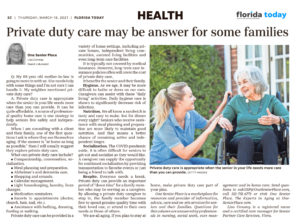
 Lisa Conway, One Senior Place – Special to FLORIDA TODAY
Lisa Conway, One Senior Place – Special to FLORIDA TODAY
Q: My 88-year old mother-in-law is going to move in with us. She needs help with some things and I’m not sure I can handle it. My neighbor mentioned private duty care?
 A: Private duty care is appropriate when the senior in your life needs more care than you can provide. It can be quite affordable. A source of professional quality home care is one strategy to help seniors live safely and independently.
A: Private duty care is appropriate when the senior in your life needs more care than you can provide. It can be quite affordable. A source of professional quality home care is one strategy to help seniors live safely and independently.
When I am consulting with a client and their family, one of the first questions I ask is where they see themselves aging. If the answer is “at home as long as possible,” then I will usually suggest they explore private duty care.
What can private duty care include?
- Companionship, conversation, socialization.
- Meal planning and preparation.
- Alzheimer’s and dementia care.
- Shopping and errands.
- Calendar management.
- Light housekeeping, laundry, linen changes.
- Medication reminders.
- Escorts to appointments (doctor, church, hair, nail, etc.).
- Assistance with bathing, dressing, feeding or walking.
Private duty care can be provided in a variety of home settings, including private homes, independent living communities, assisted living facilities and even long-term care facilities.
It is typically not covered by medical insurance. However, long-term care insurance policies often will cover the cost of private duty care.
It benefits the senior and their family.
Hygiene. As we age, it may be more difficult to bathe or dress on our own. Caregivers can assist with these “daily living” activities. Daily hygiene care is shown to significantly decrease risk of infection.
Nutrition. We all know a sandwich is tasty and easy to make. But for dinner every night? Seniors who receive assistance with meal planning and preparation are more likely to maintain good nutrition. And that means a better chance of remaining active and independent longer.
Socialization. The COVID pandemic aside, it is often difficult for seniors to get out and socialize as they would like. A caregiver can supply the opportunity for continued socialization by providing transportation to favorite events or just being a friend to talk with.
Respite. Everyone needs a break. Private duty can provide an important period of “down time” for a family member who may be serving as a caregiver. By allowing a private duty caregiver to step in, the family member becomes free to spend genuine quality time with their loved one, or attend to their own needs or those of others.
We are all aging. If you plan to stay at home, make private duty care part of your plan.
# # #
One Senior Place is a marketplace for resources and a provider of information, advice, care and on-site services for seniors and their families. Questions for this column are answered by professionals in nursing, social work, care management and in-home care. To submit a question, send an email to askOSP@OneSeniorPlace.com or visit One Senior Place, The Experts in Aging at OneSeniorPlace.com.
Lisa Conway is a Registered Nurse and a Certified Care Manager for Senior Partner Care Services in Viera.


